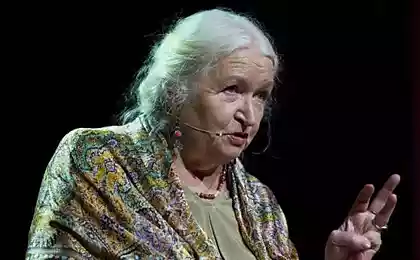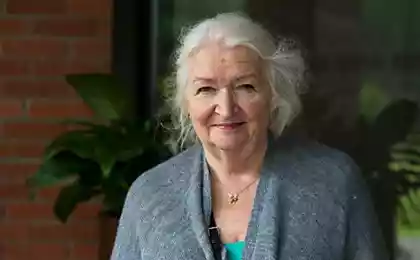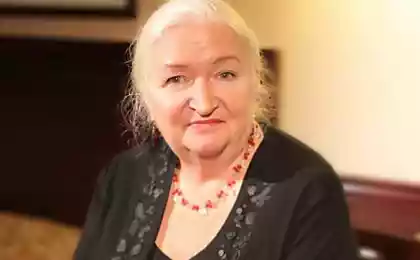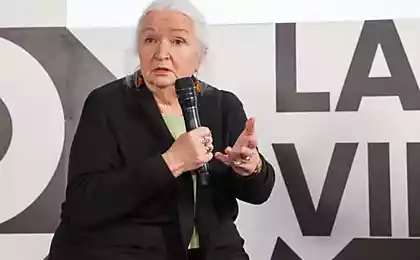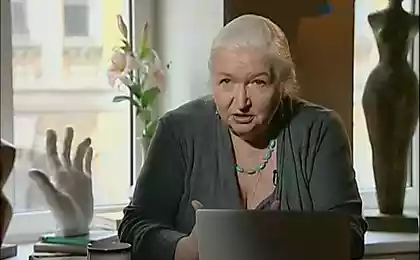818
Tatyana Chernigov: The brain remembers everything by what you have gone on seeing it and that smell
We present our interview with the St. Petersburg State University professor Tatyana Vladimirovna Chernigov.
- How did you get to the Faculty of Philology
? - I came to the English Department of Philology of stupidity. I finished very strong English school №213, then it was the only one in the country and already well spoken in English. Because it is unclear why it was necessary to go to the English Department.
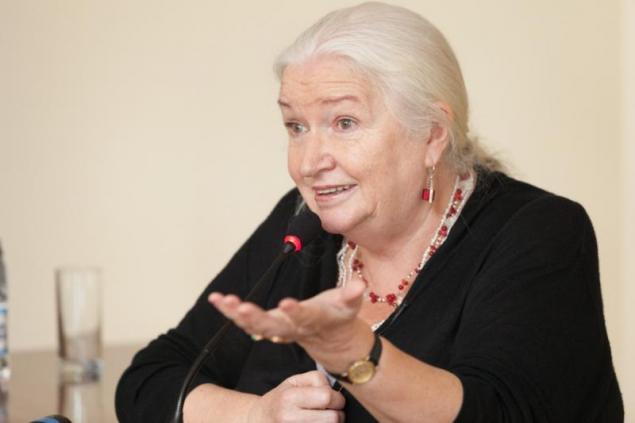
Before that I had the idea to go to the history of art, the year has been preparing in the history department, but then changed her mind. Then a short time had the idea to go to the Japanese branch at the Faculty of Oriental Studies. However, for admission to the Faculty of Oriental Studies we needed some recommendations of district committees, the ideological rationale - it is not a game in which I played. And besides, they preferred boys, that is correct. Because mostly students prepared for diplomatic work.
In short, for some reason I entered the philological faculty, despite the fact that the competition was a giant. I console myself that my final choice influenced advice grandfather of my son (the future grandfather, of course) - Victor Valerianovich Bunak was very large anthropologist. He was very skeptical about my decision, but said that in such a case should go to the Department of Phonetics, where he teaches Margarita Matusevich and Leo Rafailovich Zinder. "This is at least true science" - he admonished me
. I do not want to offend anyone by saying that a purely humanitarian fields of knowledge is not a science. But the formal division of the scale there is «science» and «arts». So there, at the Department of Phonetics, much more «science». Always I am grateful to Victor Valerianovich because I did all these years she studied at the department. Then it has not yet been issued. Now she has a specialization "Speech Technologies". So technically I have the diploma of English philology, but really I was engaged in experimental phonetics: perception of speech, there are all kinds of spectra, waveforms. That was such a path.
- When do you think will be decoded speech phenomenon
? - You see, you put the question so that the answer to it all can not be. We imagine now, what is this phenomenon. I read a lecture to students about what human language different from other types of communications, including by computer languages, the language of animals and so on. Communication is at all, including single-celled - one chemical, one electric. The question is, what in the human language of that which does not exist in other "languages". This is the subject of serious research, which involved people of different disciplines: anthropologists, experts in artificial intelligence, linguistics, biology, and zoopsychologists - this is an incomplete list. And we are very much on this subject know, but it's a long conversation.
- In your opinion, what important discoveries in the field of linguistics have been made in Russia in the last twenty years
? - I'm not sure I can answer your question. Because it is not physics, where they recently caught the Higgs boson. In linguistics, such things do not happen. Or, anyway, I'm not the one who knows about it. Maybe you read some unread before the inscription on the stone. In general, this is not an area in which we are waiting for any miracles, breakthrough discoveries. It is rather a slow careful accumulation of material and the subsequent conclusion of the withdrawal.
I believe that one of the most promising areas for the study is to investigate the origin of language: how it differs from the rest, whether originated in the same place at the same time or at different points of the planet. And what language was the "first", so to say, it was the sounds of the language - or gestures? This is a long topic. After all, how can there be an opening? What suddenly find a dictaphone recording of what happened 15,000 years ago? This we do not expect. But the discovery of its kind made all the time, archaeologists found birch bark, and they showed this, did not know before. This happens a lot, these findings are a high price, through careful long-term work.
- You can say you do the study of the brain, to get closer to unraveling the mechanism of speech device
? - To be more precise - language. Language - a system. This - this is what we are now going on with you. But in order for this to happen, we have in mind is to be a virtual textbook of the language in which we speak. But why then the brain? Only the brain knows how to actually constructed language. This is confirmed by the fact that every healthy child of the Earth in a very short time, masters the most complex of all possible systems without teachers. And I never tire of saying, the child - this is not a tape recorder. People who have little know about it, they say: what wonder he's heard, here and remember. No, he did not "hear and remember," and his brain analyzes and wrote the rules system. Here is what the brain does. Therefore, if the brain allowed us to this information (as we all are busy and to it from the brain kak-to extract), then we would know, in fact, for example, have to write grammar books, how do people train . Because we - the pianist is playing, how can they say - we, as they could write textbooks. But right "books" can write the brain, which he does every day millions of times.
- Scientists are trying to understand how the brain is wired. To what extent this area already explored - about as much as the world's oceans studied
? - I think less. Despite the fact that on this issue across the world working great teams, intellectual elites. This is not the immediate area, there invested a lot of money, and she studied very serious people. But nothing of the fact that people know in the universe, is more complex than the brain, no. Perhaps the brain even more complex than the universe. In any case, these two objects are comparable. Therefore, it is not necessary illusions on the subject that we are "about to" learn. Talk about the fact that we know 5 percent or 10 or 125 - do not mean anything. They price - zero. As well as talking about the fact that we use 5 percent of their brain. It is not possible to calculate this, it is not much to discuss.
The study of the brain - it's a long way, which requires the highest level professionals from different areas of knowledge: artificial intelligence, of course, neuroscience, linguistics, semiotics, different types of biology, psychology, etc. Wanted people who are able to simulate various complex processes. And, as a rule, these projects involve multi-disciplinary teams. That is not what mathematics sit in Africa, and genetics - in France. Maybe so, but given a modern communication system, no matter who sits where, it is important that they should work together, it is very difficult. Because it is a different science. Therefore, the recent talk about the convergence of sciences: it is not something that everyone should gather in one room. Speech about the fact that people need to have at least some idea of the neighboring sciences. The chair on which we are now called "convergence Department of Natural Sciences and Humanities". That's it - we are our students and masters in the direction of "Cognitive Studies" and teach biology, and psychology, and linguistics and mathematics, and our colleagues from the Institute of Human Brain will come to read lectures. And here are the students - potentially the people who are working in these areas
. - It turns out that the only right direction now - get away from the isolation of Sciences
. - We have no other way out, it's already happened. Here the danger is different: because the convergence has already gone around the world, would not have happened so that the circle will go solid amateurs. What will not be solid professionals who know their region. I think so, and with me many agree that people should get their bachelor's basic education for some of the specialty, and after that can do such Masters programs to be fed with the "juice" of the other "fruits and vegetables».
- Do you feel resistance from the previous generation of scientists who do not share this point of view
? - I can not feel. But this does not mean that they do not exist and there is no resistance. Maybe I was just lucky, and I talk with other people. But I did not meet any resistance, on the contrary I see enthusiasm, and as you can guess, I have extensive professional contacts in St. Petersburg, as in Moscow and abroad. And here we are all one. Naturally, the left step, step to the right - "shooting". You can enter into the next room, and there is nothing about that people do not hear and engage with its narrow chores. And let them do, to your health! We are quite enough, no one is obliged to leave their narrow area, such as deciphering the Phaistos disc. Let decipher, I am delighted with these people, I just do not know how and I, this type of work would not be interested. But it is a fact of my biography, not theirs. Therefore, "fashion" - not in a bad sense, a trend that we are discussing - no doubt, is in the world. But this does not mean that all other areas need to strangle and say "now we are going to work that way." Let them be pure linguists, physicists, chemists, writers, no one bothers.
- What are you currently engaged
? - I always do a lot of things in parallel. The main field of my work and my colleagues - the organization of the mental lexicon - is the way that the brain, in what way, by what algorithm ensures the functioning of the human language, attention, memory. For this there are different methods, including experimental techniques used in psycholinguistics or experimental psychology. Other programs, such as «E-prime».
In addition, we have a wonderful device that detects saccades - micromotion eyes during some activities. This device is used all over the world, it is not cheap, quite frankly, and thank you and sponsors and the University - we have received a large grant - can afford such a device. It is interesting because it allows you to watch the focus of your attention, then, what do you do when, for example, consider something or reading the text. At any point you stop at any point you come back - that shows that they are difficult and require additional treatment. But some things you miss - so they go automatically. In short, it is a way to look into the processes in which we otherwise can not see. Because even you are reading the text, have no idea what's going on while you're reading it. But when using our device look at this - to learn amazement, what did you do as we have already amazed
. - Similar studies are already under way in the West. Which of the results reached by scientists?
- The results of a lot and the question to be answered in each particular case. But in any case, it is an effective instrument that everyone who can afford it financially afford, try to take over. Here we work together with the Institute of the brain, and, thanks to the director of the institute and Svyatoslav Vsevolodovich Medvedev, we are able to work not only with sophisticated EEG, but positron emission tomography, a functional magnetic resonance. So just buy the lab like no one alone can not afford. Very expensive, not necessary, because it will require a huge staff of people who will still serve, experts, including mathematicians, who will process the data, etc. This kind of thing can only be done in collaboration, what we are doing.
I also work with clinical linguistics, ie patients - adults and children who for some reason disturbed language function. Strictly speaking, in such a paradigm of work all the major research centers in the world. In this sense, we are absolutely on a global level and, moreover, represents the interests of the international community. Because when we are not talking about the attention or memory - that is another story, namely, the language, the data obtained on the material of such a complex language like Russian, it is very interesting to the international scientific community. Here's why: the brain at all is one, no matter who speaks the language. But the very languages which about six thousand in the world, so different, that it is necessary to think, and what happens in the brains of people who speak different languages, despite the fact that the brain is fundamentally the same. As the brain develops the most common algorithms, despite the difference in language? Therefore, these data fills white spots that otherwise can not be filled. It is not only Russian, and Finnish, and, for example, Telugu - many languages, small protsentik of which is investigated in this sense. Therefore, I repeat, the data of the Russian language lie in the common fund is not as one of ordinary stones, but as a rather severe diamonds.
- About the Russian language. Journalism Faculty of Philology was born on. The language of journalism evolved in the last 20-30 years. Tell me, what do you think should be the language of modern journalism?
- Modern language is not only journalism, but anyone should be diverse. That's what I mean: there are styles of speech, there are speech genres. You will not speak to the child in such a way that you talk to a university department or speaking at an international congress. Therefore, for every educated person, I am convinced, a matter of honor to know your language well, and it is better not only their own. The speaker must be able to move from the register to the register, it is important. Because if a person only has any one style of communication, so in many social circles, it just will not be understood.
For example, I have to speak in public. Tomorrow in Moscow the day after tomorrow I will give lectures in the same Moscow. And I must say that those colleagues who are similar to my life, know that no report or a lecture can not be repeated. Because it always will be fundamentally different audience. This means that you'll tell the other things and, most importantly, a different way. Tomorrow I will speak at the exhibition "EXPO 2013", there is a block called "The Man of the XXI century". I imagine that there will sit different audience, but certainly not the scientists, but the heads of large companies, large managers. And I have to talk to them so that they understand me. This does not mean the level of decline, this means switching to another language - I do not plan to talk to them as would a plumbers talk. Although plumber can tell you everything about what we say. I undertake to explain to the dispute who want at least five children. But for that I have to have a different set of tools. And I should know how to use it. Therefore, looking at the audience will understand how I should speak. See the audience, you see his eyes, they realize it or not, are on this note or not hit. In fact, this is a very difficult task.
- Skill
. - Yes, it is a skill that is acquired, not by itself from somewhere flies. This should be taught, so I'm his students, post-graduates, telling about the same as you. I tell them: you have to know exactly to whom you speak, who are these people. These people know more than you do in this area - then one way to talk to them, they do not need to tell me that the brain is in the head. But if the people who knew nothing about this area, it makes your performance even more difficult! You have to speak so that they are not given up - "something she weaves is that I do not quite understand." And, back to your question about journalism, it's exactly that, as a journalist should understand: to whom he says. He should not unnecessarily take frivolous style, when it is in the academic world, unless he plays. I can also start to play it, but I can afford it, because in a moment I will move to a completely different register. And I do it on purpose, for example, to establish contact with the young audience. I turn briefly to their language, to catch in his trap, and then announce: "Actually, we are talking about serious things»
. - We talked, how to speak to the journalist. But what we should talk?
- Mankind should be informed that if it does not come to his senses, to live it for long. What I'm doing, though not a journalist. "Apocalyptic" scenario all the time telling. We are overworked. You see, nature is more powerful than we are. Even our brains are not comparable, billions of times more powerful than those in which it is located. Therefore, you need to take it seriously. Do not think that you can play with it. You can not play with earthquakes, tsunamis. You can not play with the brain, it's not a toy, it's dangerous.
Therefore, people have to imagine that if they read a magazine "Lisa" chew "Stimorol 'round the clock, and" because I deserve it "- shampoos read that they are written on the label, and stain removers to learn, let them then they are not complain! They will have a different brain, millions of people. Потому что мозг строится на основе двух основных вещей — это генетика, против которой ничего сделать не можешь, и то, что на нейронной сети пишется.
Нейронная сеть строится во время жизни, и сейчас тоже, пока мы с вами разговариваем. Она строится каждую секунду, поэтому нельзя читать плохие тексты, нельзя слушать плохую музыку, нельзя есть плохую еду — это все одно и то же, потому что это попадает к вам и ничто никуда не высыпается. Мозг помнит все, мимо чего вы прошли, на что посмотрели, что унюхали и что услышали. Это всё там. Если вы хотите туда побольше яду напустить, то верный путь читать журнал «Лиза», условно говоря. (Я даже не знаю, есть ли такой журнал, по крайней мере, был. Я его один раз видела и теперь привожу в пример. Разумеется, не открыла ни разу.) Все это принципиально важные вещи, о которых следует помнить.
—Вера, Надежда, Любовь. Насколько эти, ставшие именами нарицательными, три составляющие должны присутствовать в науке?
— На сто процентов все три. Потому что наука — это не только мозг. Это еще и ответственность, причем, очень большая. Общество не должно недооценивать опасности, которые существуют вокруг него. А ученые — это те люди, которые про эти опасности должны рассказать. Но общество должно им доверять. Понимаете, если общество будет заниматься тем, что станет разрушать академические институты, то плоды не за горами, это точно. Можно делать вид, что это не так, от этого Вселенной ни холодно, ни жарко. Есть объективные законы: в XXI веке общество живет наукой, поэтому к ней надо относиться серьезно.
Беседовала Камила Мирзакаримова
- How did you get to the Faculty of Philology
? - I came to the English Department of Philology of stupidity. I finished very strong English school №213, then it was the only one in the country and already well spoken in English. Because it is unclear why it was necessary to go to the English Department.

Before that I had the idea to go to the history of art, the year has been preparing in the history department, but then changed her mind. Then a short time had the idea to go to the Japanese branch at the Faculty of Oriental Studies. However, for admission to the Faculty of Oriental Studies we needed some recommendations of district committees, the ideological rationale - it is not a game in which I played. And besides, they preferred boys, that is correct. Because mostly students prepared for diplomatic work.
In short, for some reason I entered the philological faculty, despite the fact that the competition was a giant. I console myself that my final choice influenced advice grandfather of my son (the future grandfather, of course) - Victor Valerianovich Bunak was very large anthropologist. He was very skeptical about my decision, but said that in such a case should go to the Department of Phonetics, where he teaches Margarita Matusevich and Leo Rafailovich Zinder. "This is at least true science" - he admonished me
. I do not want to offend anyone by saying that a purely humanitarian fields of knowledge is not a science. But the formal division of the scale there is «science» and «arts». So there, at the Department of Phonetics, much more «science». Always I am grateful to Victor Valerianovich because I did all these years she studied at the department. Then it has not yet been issued. Now she has a specialization "Speech Technologies". So technically I have the diploma of English philology, but really I was engaged in experimental phonetics: perception of speech, there are all kinds of spectra, waveforms. That was such a path.
- When do you think will be decoded speech phenomenon
? - You see, you put the question so that the answer to it all can not be. We imagine now, what is this phenomenon. I read a lecture to students about what human language different from other types of communications, including by computer languages, the language of animals and so on. Communication is at all, including single-celled - one chemical, one electric. The question is, what in the human language of that which does not exist in other "languages". This is the subject of serious research, which involved people of different disciplines: anthropologists, experts in artificial intelligence, linguistics, biology, and zoopsychologists - this is an incomplete list. And we are very much on this subject know, but it's a long conversation.
- In your opinion, what important discoveries in the field of linguistics have been made in Russia in the last twenty years
? - I'm not sure I can answer your question. Because it is not physics, where they recently caught the Higgs boson. In linguistics, such things do not happen. Or, anyway, I'm not the one who knows about it. Maybe you read some unread before the inscription on the stone. In general, this is not an area in which we are waiting for any miracles, breakthrough discoveries. It is rather a slow careful accumulation of material and the subsequent conclusion of the withdrawal.
I believe that one of the most promising areas for the study is to investigate the origin of language: how it differs from the rest, whether originated in the same place at the same time or at different points of the planet. And what language was the "first", so to say, it was the sounds of the language - or gestures? This is a long topic. After all, how can there be an opening? What suddenly find a dictaphone recording of what happened 15,000 years ago? This we do not expect. But the discovery of its kind made all the time, archaeologists found birch bark, and they showed this, did not know before. This happens a lot, these findings are a high price, through careful long-term work.
- You can say you do the study of the brain, to get closer to unraveling the mechanism of speech device
? - To be more precise - language. Language - a system. This - this is what we are now going on with you. But in order for this to happen, we have in mind is to be a virtual textbook of the language in which we speak. But why then the brain? Only the brain knows how to actually constructed language. This is confirmed by the fact that every healthy child of the Earth in a very short time, masters the most complex of all possible systems without teachers. And I never tire of saying, the child - this is not a tape recorder. People who have little know about it, they say: what wonder he's heard, here and remember. No, he did not "hear and remember," and his brain analyzes and wrote the rules system. Here is what the brain does. Therefore, if the brain allowed us to this information (as we all are busy and to it from the brain kak-to extract), then we would know, in fact, for example, have to write grammar books, how do people train . Because we - the pianist is playing, how can they say - we, as they could write textbooks. But right "books" can write the brain, which he does every day millions of times.
- Scientists are trying to understand how the brain is wired. To what extent this area already explored - about as much as the world's oceans studied
? - I think less. Despite the fact that on this issue across the world working great teams, intellectual elites. This is not the immediate area, there invested a lot of money, and she studied very serious people. But nothing of the fact that people know in the universe, is more complex than the brain, no. Perhaps the brain even more complex than the universe. In any case, these two objects are comparable. Therefore, it is not necessary illusions on the subject that we are "about to" learn. Talk about the fact that we know 5 percent or 10 or 125 - do not mean anything. They price - zero. As well as talking about the fact that we use 5 percent of their brain. It is not possible to calculate this, it is not much to discuss.
The study of the brain - it's a long way, which requires the highest level professionals from different areas of knowledge: artificial intelligence, of course, neuroscience, linguistics, semiotics, different types of biology, psychology, etc. Wanted people who are able to simulate various complex processes. And, as a rule, these projects involve multi-disciplinary teams. That is not what mathematics sit in Africa, and genetics - in France. Maybe so, but given a modern communication system, no matter who sits where, it is important that they should work together, it is very difficult. Because it is a different science. Therefore, the recent talk about the convergence of sciences: it is not something that everyone should gather in one room. Speech about the fact that people need to have at least some idea of the neighboring sciences. The chair on which we are now called "convergence Department of Natural Sciences and Humanities". That's it - we are our students and masters in the direction of "Cognitive Studies" and teach biology, and psychology, and linguistics and mathematics, and our colleagues from the Institute of Human Brain will come to read lectures. And here are the students - potentially the people who are working in these areas
. - It turns out that the only right direction now - get away from the isolation of Sciences
. - We have no other way out, it's already happened. Here the danger is different: because the convergence has already gone around the world, would not have happened so that the circle will go solid amateurs. What will not be solid professionals who know their region. I think so, and with me many agree that people should get their bachelor's basic education for some of the specialty, and after that can do such Masters programs to be fed with the "juice" of the other "fruits and vegetables».
- Do you feel resistance from the previous generation of scientists who do not share this point of view
? - I can not feel. But this does not mean that they do not exist and there is no resistance. Maybe I was just lucky, and I talk with other people. But I did not meet any resistance, on the contrary I see enthusiasm, and as you can guess, I have extensive professional contacts in St. Petersburg, as in Moscow and abroad. And here we are all one. Naturally, the left step, step to the right - "shooting". You can enter into the next room, and there is nothing about that people do not hear and engage with its narrow chores. And let them do, to your health! We are quite enough, no one is obliged to leave their narrow area, such as deciphering the Phaistos disc. Let decipher, I am delighted with these people, I just do not know how and I, this type of work would not be interested. But it is a fact of my biography, not theirs. Therefore, "fashion" - not in a bad sense, a trend that we are discussing - no doubt, is in the world. But this does not mean that all other areas need to strangle and say "now we are going to work that way." Let them be pure linguists, physicists, chemists, writers, no one bothers.
- What are you currently engaged
? - I always do a lot of things in parallel. The main field of my work and my colleagues - the organization of the mental lexicon - is the way that the brain, in what way, by what algorithm ensures the functioning of the human language, attention, memory. For this there are different methods, including experimental techniques used in psycholinguistics or experimental psychology. Other programs, such as «E-prime».
In addition, we have a wonderful device that detects saccades - micromotion eyes during some activities. This device is used all over the world, it is not cheap, quite frankly, and thank you and sponsors and the University - we have received a large grant - can afford such a device. It is interesting because it allows you to watch the focus of your attention, then, what do you do when, for example, consider something or reading the text. At any point you stop at any point you come back - that shows that they are difficult and require additional treatment. But some things you miss - so they go automatically. In short, it is a way to look into the processes in which we otherwise can not see. Because even you are reading the text, have no idea what's going on while you're reading it. But when using our device look at this - to learn amazement, what did you do as we have already amazed
. - Similar studies are already under way in the West. Which of the results reached by scientists?
- The results of a lot and the question to be answered in each particular case. But in any case, it is an effective instrument that everyone who can afford it financially afford, try to take over. Here we work together with the Institute of the brain, and, thanks to the director of the institute and Svyatoslav Vsevolodovich Medvedev, we are able to work not only with sophisticated EEG, but positron emission tomography, a functional magnetic resonance. So just buy the lab like no one alone can not afford. Very expensive, not necessary, because it will require a huge staff of people who will still serve, experts, including mathematicians, who will process the data, etc. This kind of thing can only be done in collaboration, what we are doing.
I also work with clinical linguistics, ie patients - adults and children who for some reason disturbed language function. Strictly speaking, in such a paradigm of work all the major research centers in the world. In this sense, we are absolutely on a global level and, moreover, represents the interests of the international community. Because when we are not talking about the attention or memory - that is another story, namely, the language, the data obtained on the material of such a complex language like Russian, it is very interesting to the international scientific community. Here's why: the brain at all is one, no matter who speaks the language. But the very languages which about six thousand in the world, so different, that it is necessary to think, and what happens in the brains of people who speak different languages, despite the fact that the brain is fundamentally the same. As the brain develops the most common algorithms, despite the difference in language? Therefore, these data fills white spots that otherwise can not be filled. It is not only Russian, and Finnish, and, for example, Telugu - many languages, small protsentik of which is investigated in this sense. Therefore, I repeat, the data of the Russian language lie in the common fund is not as one of ordinary stones, but as a rather severe diamonds.
- About the Russian language. Journalism Faculty of Philology was born on. The language of journalism evolved in the last 20-30 years. Tell me, what do you think should be the language of modern journalism?
- Modern language is not only journalism, but anyone should be diverse. That's what I mean: there are styles of speech, there are speech genres. You will not speak to the child in such a way that you talk to a university department or speaking at an international congress. Therefore, for every educated person, I am convinced, a matter of honor to know your language well, and it is better not only their own. The speaker must be able to move from the register to the register, it is important. Because if a person only has any one style of communication, so in many social circles, it just will not be understood.
For example, I have to speak in public. Tomorrow in Moscow the day after tomorrow I will give lectures in the same Moscow. And I must say that those colleagues who are similar to my life, know that no report or a lecture can not be repeated. Because it always will be fundamentally different audience. This means that you'll tell the other things and, most importantly, a different way. Tomorrow I will speak at the exhibition "EXPO 2013", there is a block called "The Man of the XXI century". I imagine that there will sit different audience, but certainly not the scientists, but the heads of large companies, large managers. And I have to talk to them so that they understand me. This does not mean the level of decline, this means switching to another language - I do not plan to talk to them as would a plumbers talk. Although plumber can tell you everything about what we say. I undertake to explain to the dispute who want at least five children. But for that I have to have a different set of tools. And I should know how to use it. Therefore, looking at the audience will understand how I should speak. See the audience, you see his eyes, they realize it or not, are on this note or not hit. In fact, this is a very difficult task.
- Skill
. - Yes, it is a skill that is acquired, not by itself from somewhere flies. This should be taught, so I'm his students, post-graduates, telling about the same as you. I tell them: you have to know exactly to whom you speak, who are these people. These people know more than you do in this area - then one way to talk to them, they do not need to tell me that the brain is in the head. But if the people who knew nothing about this area, it makes your performance even more difficult! You have to speak so that they are not given up - "something she weaves is that I do not quite understand." And, back to your question about journalism, it's exactly that, as a journalist should understand: to whom he says. He should not unnecessarily take frivolous style, when it is in the academic world, unless he plays. I can also start to play it, but I can afford it, because in a moment I will move to a completely different register. And I do it on purpose, for example, to establish contact with the young audience. I turn briefly to their language, to catch in his trap, and then announce: "Actually, we are talking about serious things»
. - We talked, how to speak to the journalist. But what we should talk?
- Mankind should be informed that if it does not come to his senses, to live it for long. What I'm doing, though not a journalist. "Apocalyptic" scenario all the time telling. We are overworked. You see, nature is more powerful than we are. Even our brains are not comparable, billions of times more powerful than those in which it is located. Therefore, you need to take it seriously. Do not think that you can play with it. You can not play with earthquakes, tsunamis. You can not play with the brain, it's not a toy, it's dangerous.
Therefore, people have to imagine that if they read a magazine "Lisa" chew "Stimorol 'round the clock, and" because I deserve it "- shampoos read that they are written on the label, and stain removers to learn, let them then they are not complain! They will have a different brain, millions of people. Потому что мозг строится на основе двух основных вещей — это генетика, против которой ничего сделать не можешь, и то, что на нейронной сети пишется.
Нейронная сеть строится во время жизни, и сейчас тоже, пока мы с вами разговариваем. Она строится каждую секунду, поэтому нельзя читать плохие тексты, нельзя слушать плохую музыку, нельзя есть плохую еду — это все одно и то же, потому что это попадает к вам и ничто никуда не высыпается. Мозг помнит все, мимо чего вы прошли, на что посмотрели, что унюхали и что услышали. Это всё там. Если вы хотите туда побольше яду напустить, то верный путь читать журнал «Лиза», условно говоря. (Я даже не знаю, есть ли такой журнал, по крайней мере, был. Я его один раз видела и теперь привожу в пример. Разумеется, не открыла ни разу.) Все это принципиально важные вещи, о которых следует помнить.
—Вера, Надежда, Любовь. Насколько эти, ставшие именами нарицательными, три составляющие должны присутствовать в науке?
— На сто процентов все три. Потому что наука — это не только мозг. Это еще и ответственность, причем, очень большая. Общество не должно недооценивать опасности, которые существуют вокруг него. А ученые — это те люди, которые про эти опасности должны рассказать. Но общество должно им доверять. Понимаете, если общество будет заниматься тем, что станет разрушать академические институты, то плоды не за горами, это точно. Можно делать вид, что это не так, от этого Вселенной ни холодно, ни жарко. Есть объективные законы: в XXI веке общество живет наукой, поэтому к ней надо относиться серьезно.
Беседовала Камила Мирзакаримова





